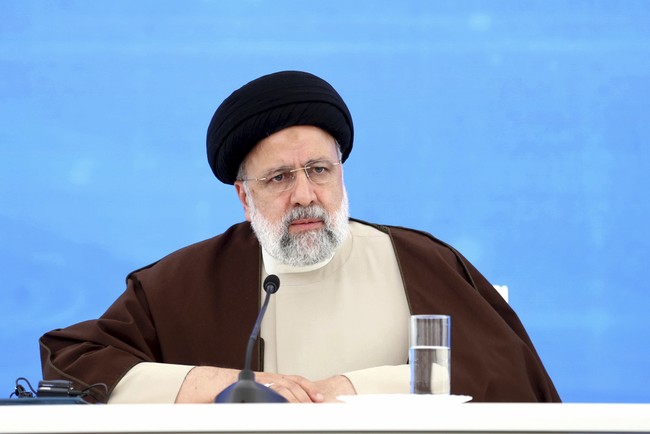Global Outcry Over UN's Tribute to 'Butcher of Tehran'
The United Nations faces intense backlash for memorializing Ebrahim Raisi, Iran's late president, accross various platforms globally.
Published May 31, 2024 - 00:05am

Image recovered from redstate.com
Antonio Guterres reiterated his deepest condolences to the government and people of Iran UNITED NATIONS, May 30. /TASS/. Iranian President Ebrahim Raisi, who died in an air crash, led the country in difficult times for both the country and the world as a whole, UN Secretary-General Antonio Guterres said at a commemorative event at the UN General Assembly.
"President Raisi led Iran at a challenging time for the country, the region and globally," he said. "In these difficult times, international and regional cooperation are needed more than ever. <....>. I wish to assure that the United Nations stands in solidarity with the Iranian people." Guterres reiterated his deepest condolences to the government and people of Iran.
On May 19, a helicopter carrying Raisi crashed in East Azerbaijan province in northern Iran. Along with Raisi, the foreign minister and a number of state officials of the Islamic republic were on board. All passengers and crew died. An early presidential election will be held on June 28. As The New York Times noted, the plane crash occurred at a delicate moment for international relations, two days after indirect talks between Iran and the United States to reduce the threat posed by a growing conflict in the Middle East.
The United Nations has announced plans to hold a memorial ceremony for the late Iranian president, Ebrahim Raisi, this week, sparking sharp criticism from rights activists, who decried a move to honor a man they refer to as the "Butcher of Tehran." UN General Assembly President Dennis Francis said he will convene the tribute on May 30, with member states "encouraged" to deliver statements at the meeting "to pay tribute" to Raisi, who along with Foreign Minister Hossein Amir-Abdollahian and several other officials, died in a helicopter crash on May 19.
The tribute has sparked a wave of criticism from activists who refer to Raisi's alleged role in the mass execution of political prisoners in 1988, when he was Tehran's deputy prosecutor. In addition, they said that as president he oversaw a brutal, and sometimes deadly, crackdown on dissent during protests in Iran after the death of Mahsa Amini, who was in police custody for an alleged head-scarf violation when she died.
"When the governments of the world elevate a blatant human rights violator and butcher from Iran's history to a position of honor, as if mourning a peace-loving and democratic figure, they set a dangerous precedent," Nobel Peace Prize laureate Narges Mohammadi wrote from her prison cell in Tehran.
"The U.N. should be standing with the civilians, Raisi was involved in numerous, horrific human rights abuses, including the extrajudicial killings of thousands of political prisoners in 1988," said spokesman for the U.S. delegation, Nate Evans. "Some of the worst human rights abuses on record took place during his tenure," Evans added. Protests and visible discontent with the UN's decision to honor Raisi have swept across public opinion, with demonstrations outside the U.N. headquarters and a wave of disapproval from organizations around the world, including Iranian rights activists and Nobel laureates.
The sudden passing of Iranian President Ebrahim Raisi has not only left a nation in mourning but has also triggered a geopolitical shift that could impact the stability of the region and the international community at large. Raisi's administration, although marked by considerable internal and foreign challenges, strived to navigate the intricacies of global diplomacy, particularly concerning Iran's nuclear program and its relations with the Western world. His untimely death raises numerous questions regarding the future direction of these diplomatic efforts.
Prior to the fatal crash, President Raisi had been an advocate for lifting economic sanctions imposed on Iran, arguing that such measures were detrimental to the Iranian people. He pushed for a withstanding resolution in the contentious nuclear deal talks, hoping to revitalize an economy crippled by sanctions and the global pandemic. On the domestic front, Raisi's agenda focused on anti-corruption measures and an economic reform that aimed to improve living standards for Iranians, despite facing criticism over human rights issues.
Notably, the tragedy strikes as Iran grapples with internal strife and external pressures. The country, already dealing with economic difficulties exacerbated by sanctions, now faces political uncertainty. This uncertainty extends to the complicated landscape of Middle Eastern politics, where Iran plays a crucial role. The international community watches closely as the upcoming early presidential election may offer insights into Iran's future policies and approaches toward pressing issues like its nuclear pursuits and regional influence.
Reflecting the weighty implications of this moment, world leaders and governments have extended their condolences, while simultaneously pondering the implications of Raisi's absence in their dealings with Iran. How Iran's political landscape will reshape in the wake of this accident remains a topic of intense speculation and concern among international affairs analysts. They suggest that the new leadership in Tehran will face the formidable task of forging a path that respects the desires of the Iranian people while satisfying the demands of the international community.
This balance of mourning and political chess underscores the complexity of international relations where every leader's presence or absence can tip the delicate scales of diplomacy and influence. As the world continues to react to the sudden demise of President Raisi, the juxtaposition of condolence and critique serves as a reminder of the multifaceted roles global figures play on the stage of world politics.







